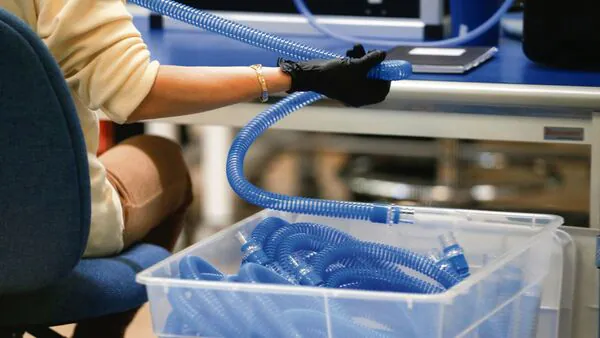
India's Newest Health Surveillance Weapon Isn't Human - It's An AI Tool That Flagged Over 5,000 Risks: Report
This tool, called 'Health Sentinel', developed by New Delhi-based healthcare AI solutions provider Wadhwani AI, represents India's newest weapon in digital surveillance.
The use of AI could have helped cut 98% of manual workload, facilitating a much quicker detection of outbreaks and a proactive public health response, according to the paper, as reported by news agency PTI.
Nearly 200 countries across the globe are legally bound by the International Health Regulations (IHR) to operate a national disease surveillance system. The IHR and World Health Organization work in collaboration to protect global health security.
How does the AI tool work?'Health Sentinel' operates by scanning a vast amount of media reports and news articles everyday in 13 languages to detect unusual health events, which are then shared with authorities for further action, if deemed necessary.
The authors wrote,“From April 2022 till date, Health Sentinel has processed over 300 million news articles and identified over 95,000 unique health events across India of which over 3,500 events (four per cent) were shortlisted by the public health experts at NCDC as potential outbreaks.”
According to Parag Govil, the national program lead for global health security at Wadhwani AI, this artificial intelligence solution has replaced the tedious process of manually scanning newspapers, journals, and reports to identify relevant articles.
However, the system retains a“human-in-the-loop” approach, ensuring epidemiologists perform essential verification before the information is disseminated to state and district officials, PTI reported.
Vast improvements in efficiencyTraditional approaches in disease surveillance largely depend on 'passive reporting,' which involves collecting infections reports from physicians and healthcare providers.
Now that monitoring informal sources such as online media has become increasingly popular for disease surveillance, the volume of articles published everyday has also increased, making manual screening impractical, the study's authors said, including those from the National Centre for Disease Control (NCDC).
Also Read | ByHeart Recall Alert amid infant botulism outbreak - What should consumers do?The 'Health Sentinel' tool addresses this issue by using AI to extract information on unusual health events or outbreaks from news articles.
The implementation of the AI tool has resulted in a marked increase in detected events. The research team observed a 150% increase in published health events since 2022, compared to previous years of human-driven disease surveillance.
Further, in 2024, the AI tool extracted 96% of the health events published by the national surveillance system, with only 4% being identified through manual scanning of media, the report said.
Cases of event-based surveillanceA study, published in February in the Indian Journal of Medical Research: Official Journal of the Indian Council of Medical Research, demonstrated the value of an event-based surveillance system by looking at media and rumour registers in six private hospitals of Kerala's Kasaragod district.
Researchers from ICMR-National Institute of Epidemiology in Chennai and state and district health officials of Kerala developed an algorithm that analyzed case records of patients with acute febrile illness (AFI) - a fever that can last up to two weeks.
Also Read | AI holds immense potential to transform healthcare delivery, says CII Healthcare CouncilThis system identified 88 clusters of systems of interest, out of which 10 clusters were verified as events, and nine were classified as outbreaks, including dengue and Covid-19, the study said.
“The inclusion of online data in surveillance systems has improved the disease prediction ability over traditional syndromic surveillance systems,” authors from the Delhi Technological University was quoted as saying by PTI.
Legal Disclaimer:
MENAFN provides the
information “as is” without warranty of any kind. We do not accept
any responsibility or liability for the accuracy, content, images,
videos, licenses, completeness, legality, or reliability of the information
contained in this article. If you have any complaints or copyright
issues related to this article, kindly contact the provider above.

















Comments
No comment